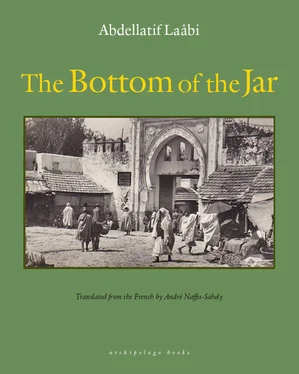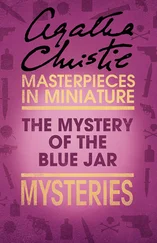Despite these outbreaks of violence, Radio Medina had begun its regular broadcasts once again. Its analyses, at times contradictory, revealed in the Fezzis a paradoxical state of being where a variety of factors were at play. They certainly admired these shadow men who were striking at the French protectorate’s foundations, but it was an admiration that was mitigated by a mixture of wariness and jealousy — wariness because the matter had to be looked at from all perspectives, and the colonial authorities might respond by wreaking havoc on Fez, a hotbed of the nationalist movement; jealousy because it was difficult to take pride in acts of heroism achieved by people who didn’t belong to our ranks. Our pride was dealt a terrible blow, especially since we were still taking our first tentative steps when it came to resistance. The rallying cry that had begun to make the rounds called for a boycott of certain products, particularly tobacco. Tobacconists took their place alongside traitors and imams glorifying Ben Aarafa in their sermons almost overnight. As for smokers, they took to practicing their vice in secret. The stubborn ones paid for their pride by receiving blows to the body from a potato studded with razor blades. Funnily enough, snuff — which was by far the most widely consumed form of tobacco — was not included in the boycott. Neither was kif, which was more understandable since it was a genuinely Moroccan product.
Despite this restraint, the climate of oppression intensified. Roundups and detentions increased and the police station in Nejjarine Square was filled to capacity. Young and not-so-young people were herded there by the truckload to be interrogated and beaten, the echoes of which reached even the Sekkatine souk. Those who were released a few days later told stories of the unheard-of things that were being plotted there. They treated the scions of large, wealthy families like ordinary bastards. They subjected them to torture and abominable humiliations. They poured salt on open wounds and gave them only a few drops of water and a morsel of dry bread to survive on each day. One of them — unable to stand it any longer — took his own life by throwing himself from the top floor, unless he had been pushed into the void by one of his torturers.
In the face of such cruelty, the mosques played host to large gatherings where the Latif was recited: “Oh Gentle One, we implore You. Heap Your kindness upon us, treat us with gentleness, oh Gentle One!” These litanies would be chanted for hours on end, and though they were manifestly peaceful, they attracted the ire of the colonial authorities. Rather than an unforgivable act of defiance, they saw them as a kind of black magic, a means by which to cast an evil curse. As the repressive measures intensified, they triggered a long-overdue response. After the first reprisals, Fez finally took its place alongside the other hotbeds of the resistance.
IT WAS IN the midst of this atmosphere, which had reached a boiling point, when an event came to pass that turned our family life upside down. It was early afternoon when we heard an explosion just outside our house. Ghita jumped up, let out a loud cry, and without a moment’s hesitation blamed it on the neighborhood kids.
“Are they trying to burst our eardrums with those firecrackers? Is this the chaâbane 14or what? Never a moment of peace with that nasty, ignorant bunch.”
More discerningly, Driss put forward another hypothesis, but didn’t dare follow his thoughts to their logical conclusion.
“Firecrackers don’t make such a ruckus. May God shield us from misfortune!”
On that note, Si Mohammed came in, having just left the Batha post office. He was pale as a ghost. His eyes, already prominent, seemed on the verge of popping out of their sockets. He was having trouble articulating and wound up whispering the terrible news: A man was just shot in the street, right in front of our door. On reaching the house, Si Mohammed had seen the man still writhing in a pool of his own blood and had had to step over him in order to get in.
Hearing this story, I don’t know what came over me. Heedless of danger, I rushed to open the door and poked my head outside. Wearing a white djellaba, the man was lying stretched out just a couple of steps from our threshold. One of his babouches had slipped off his foot and landed right next to the door. His turban had also fallen off, revealing a freshly shaved skull, which was bleeding heavily. A sugarloaf was still hanging from a piece of string tied to his right index finger. A bunch of mint was in his other hand, which was lying open. I didn’t have the time to investigate further and got very scared. That was when I felt someone grab me by the scruff of my neck; I began trembling all over. Driss was there, as panicked as I was. He yanked me away from the scene, taking the opportunity to shoot a furtive look around, then slammed the door, sliding both bolts shut.
“Get over here!” he ordered. “Do you want to bring disaster down on our heads? A curse upon this day!”
When I rejoined the rest of the family, as was to be expected, I found Ghita in a state.
“ Wili, wili !” she inveighed, slapping her thighs. “We’re trapped, and we don’t know how to get out of it. Why did they choose us? If they wanted to kill someone, couldn’t they have done it somewhere else! The Medina is so big. Now they’re going to pin this on us. Oh Moulay Idriss, we place ourselves under your protection. Get us out of this fix! Oh little mother, come to our aid!”
After that, she leaped up and scurried off to the kitchen letting out another wili, wili .
“I left the pot on the fire. The tagine is burning!”
Aside from Ghita, we were all tongue-tied. We stayed seated for a long while, apathetic, devastated, with a vacant look in our eyes, unable to think straight.
Driss was the first to rouse himself from this general apathy.
“My children,” he said, breathing in deeply, “we have to be ready for anything.”
Then he ordered my sister Zhor: “Get the ladder.”
We only understood his request when he leaned the ladder against the wall of the living room where we were assembled. Nimble as a cat, he hoisted himself up the ladder and started taking the portraits hung up there off their pegs: portraits of Mohammed ben Youssef, Allal al-Fassi, Belhassan Ouazzani, and Abdel el-Krim Khattabi, which we had long ago stopped noticing.
“Go and look for the pestle,” he ordered me.
Running to the kitchen, I tried to understand the meaning of this sudden frenzy on his part, but it was no use. When I returned, pestle in hand, I found Driss rummaging through the large wooden chest where Ghita kept certain valuables. He pulled out two engraved silver daggers, tossing them on top of the haphazard pile of portraits that were lying facedown on the ground. This gesture was even more shocking when one considered how he venerated these people and had gone to great lengths to instill the same feeling in us. One could only assume that in light of the serious danger we were about to face, his emotions needed to adapt accordingly. Without a word, Driss tore the pestle from my hand and started to smash the glass panes covering the portraits. He was in such a hurry that he damaged even the red cedar frames. He tore the photographs to shreds. And the daggers — he banged away at them as much as he could but only succeeded in slightly bending them.
“We have to prepare ourselves for the worst, my children,” he finally explained. “The police inspectors will burst in here any moment now. So we can’t leave any traces of anything that might get us into trouble. May God forgive us for having desecrated these great men whom we hold in such high esteem. But necessity has its reasons. As for the daggers, they’re nothing but things, and things can always be replaced. Come on, let’s clean up all this broken glass and flush it down the toilet. So if the police inspectors come to poke their noses in here, they will find nothing but thin air.”
Читать дальше












